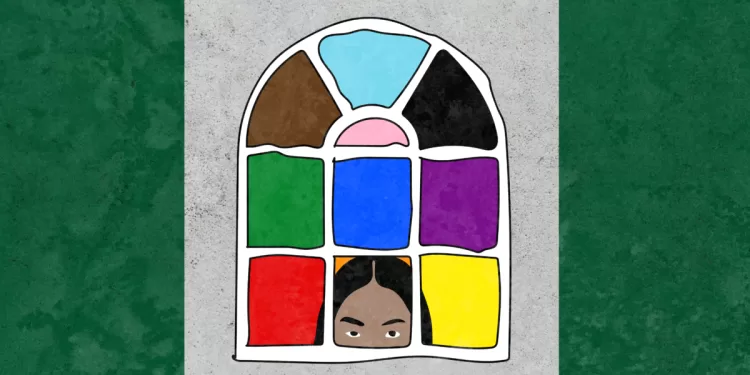Executive summary: Young queer Nigerians reflect on their experiences of coming out in conservative Nigeria. There is hope for a brighter future.
By: RABIAT MADAKI
(Minority Africa) — In his sophomore year of college, 21-year-old Alex came out as gay to his middle-aged conservative Yoruba mother. He had gotten tired of the hetero-normative ideals his mother forced on him. “She was always going on about when I’ll get a wife and kids,” he says. During one of her tirades about having a traditional family, Alex snapped and decided to come out.
“I had considered it for a while, but the thing about coming out is that you don’t really plan for it. It just happens, it’s not like today you wake up and say you’re coming out,” he says.
Much like many conservative parents, Alex’s mother viewed his sexuality as a problem that needed spiritual intervention and she immediately dragged him to see a pastor to “cure” his homosexuality. Conversion therapy is an all too common problem that many LGBTQ+ youths from conservative backgrounds endure. Such negative reactions to coming out is mostly prevalent in deeply religious and conservative households.
The pastor who Alex’s mother took him to wanted him to stay for deliverance in a section of the church where they starved people for days or weeks. On learning this, a shaken Alex retracted his statement about being gay, telling his mum, “I’m feeling better now. I don’t have that feeling I told you about; it went away the moment I saw that pastor. That thing about deliverance, mum, I’m not going.”

A survey by Nigerian NGOThe Initiative for Human Rights (TIERs) found that 49% of interviewed queer Nigerians had undergone conversion therapy while 51% said they hadn’t. Of this 51% fraction, the study did not account for people like Alex who narrowly escaped any form of conversion therapy. Further reports revealed that 36% percent of those that didn’t undergo conversion knew someone who had.
There is limited data on how many queer Nigerians have undergone conversion therapy. The majority of Nigerians identify as Christian or Muslim, which creates room to speculate that a large number of people may have undergone conversion therapy. While this may be true, there exists a fraction of Nigerians who are receptive to their gay loved ones that come out.
Alex’s brothers, who were the first people he came out to, showed support and were understanding. Still, Alex yearned for his mother’s validation even though he knew of the strong traditional and conservative ideas she held. After the initial negative experience, he had to come out a second time to his mother.
This time the message was clearer, but she still disapproves of his sexuality, often insisting that he should “switch to a girl.” Alex is 28 now and while they have their differences, he and his mother have a harmonious relationship.
For some queer people, coming out and living their sexuality to the knowledge of their conservative family is simply not an option. LGBTQIA Nigerians who embrace their sexuality often risk the possibility of being ostracised by their church and family. Favour, a 25-year-old lesbian and the daughter of a pastor, fears outright exile if she comes out to her family “My parents are unpredictable,” she explains. She once tried to tell her closest cousin that she was a lesbian, but the cousin was disappointed so Favour dismissed the reveal as a joke. “Maybe sometime soon I’ll have the courage to tell my family, but I’m not ready.”
Read Also: Benue Killings: Fulanis are celebrating Ortom’s fall – Gololo
In her social life, Favour isn’t particularly secretive about her sexuality; however, she is selective about to whom she discloses information. “Not all of my friends know, but just the few that do are okay with it,” she explains. Soon after she came out, she found her LGBTQ+ community through social media. “People were taking hints from my status uploads and going ‘are you gay? I’m gay too.”
”I think the best part of being gay is the community, everyone is so free,” Favour adds as she recalls how the LGBT+ community was a haven when she struggled with being confident in her sexuality. While Favour has a strong support system in the community, she lacks this in her close friendships. One of her closest friends is a performative ally who reads queer books and writes about them but believes that homosexuality is a sin. “She has no idea her two best friends are gay,” Favour remarks. Despite this performative allyship, Favour still stays friends as ”some people are indispensable.”
The importance of social support might be overlooked but it plays a crucial role in the lives of queer youths. Studies show that a lack of support from friends and family can negatively impact the mental health of young queer youths that are yet to fully embrace their identities. Queer individuals who receive low or zero social support are likely to struggle with accepting their sexual orientation and gender identity. Thus, a lack of support can lead to shame, internalised homophobia and identity struggle.
The exact nature of the identity struggle differs from person to person. Some people experience struggles motivated by religious ostracization, while others deal with internalised shame. John, a 20-year-old bisexual man, often questioned his sexuality while growing up. His struggle was not motivated by religion, but rather by shame. “I questioned myself a couple of times about why I would even think or want something like that — this was even after I accepted it [sexuality],” he says.
The shame soon dissipated when John got exposed to positive media on LGBTQIA. He now attributes his shame to the social stigma attached to being queer as well as false information about queer people. To this day, John still suffers from this social stigma. He explains that the stigma affects his love life by reducing his chances of finding openly gay romantic partners.
”Finding a gay man in Nigeria is like finding a bluebird,” he says. John admits that he knows a few gay men but he says ”it’s just online. They got my contact from friends that know I’m bisexual.” He adds that ”unlike a heterosexual relationship, there aren’t diverse options of partners which makes it hard to find a relationship especially when you consider that most gay men blend [in] with straight people.”
On the other hand, Alex’s experience was the opposite. As a femme gay man, he easily attracts other gay men so meeting queer men has never been an issue.
Similar to John, Favour meets potential romantic partners on social media but where the two differ is that she takes it outside of just online interactions. ”If I’m into someone, if the person is queer like me and we like each other, we get together and it ends wherever it ends,” she explains.
Lesbian relationships don’t come without their caveats. The biggest issue that Favour faces is the lack of commitment. ”Most lesbians don’t see it as a real relationship as opposed to a normal boyfriend-girlfriend relationship. They mostly think it’s about sex,” she says.
For queer people that have difficulty finding partners and a community, queer parties are the alternative to explore. But it is also not an entirely safe place to meet queer people.
“Some people are just there to bait others,” Favour says. “They call it kito. They pretend to be queer, organizing queer parties, offering jobs for queer people only for queer people to show up and get beaten and harassed. Maybe even raped.” Kito is just one of the many prejudices that plague LGBTQIA people in Nigeria. These violent acts are propelled and supported by a large number of the population. In most cases, they often go unpunished due to the Same-Sex Marriage Prohibition act.
The Same Marriage Prohibition Act or SSMPA, passed into law in 2014, places a ban on same-sex unions. It prohibits cohabitation of same-sex partners, displays of public affection between same-sex partners and bars LGBTQIA organisations and clubs. Offenders risk a jail time of 14 years. The legislation also stipulates 10-year imprisonment for queer supporters and human rights activists that speak against the law.
Since the SSMPA was enacted, the international non-governmental organisation Human Rights Watch (HRW) reports a 214 percent increase in violence against LGBTQIA people from 2014 to 2019. HRW blames this increase on the Nigerian government for authorizing and perpetrating the abuse of queer people under a vague scope of the law that gives civilians the authority to attack and infringe the human rights of LGBTQIA.
As highlighted by HRW, this legislation unjustly denounces the human rights of minorities by exposing them to discrimination. While there has been only one prosecution under SSMPA, the passage of the law gave rise to mob violence, targeted attacks, arbitrary arrest, unlawful detention, and collection of bribes, amongst other things.
The threat of violence created by SSPMA reveals the harsh reality for sexual minorities in Nigeria. Queer people are left with discretion as the only form of protection.
Many queer people are forced to hide their identity to function in society. The socio-political landscape of Nigeria demands that queer people stifle their self-expression to move freely. ”The reality is we know for a fact that the law is not on our side in this part of the world,” – Alex explains. The once free college student is now a 28-year-old civil servant with higher stakes of a career to look out for. When asked if time has changed his keenness to disclose his sexuality, Alex says: “In the past when I was asked about a girlfriend, I just go ‘I’m not into girls.’ Now, I face the question alone and say, ‘I don’t have one.’ I don’t have to tell you I’m queer because that wasn’t what you asked.”
Queer Nigerians desire to be out and free, but the burdens of that visibility weigh heavily on the shoulders of activists. Many are forced into silence by the cruel reality of everyday existence, while intra-community disputes often create backlashes on social media. The reality of coming out in Nigeria is one plagued by ostracization and violence
Despite this, Alex is glad that he came out. “These days with cruel [things] happening all around to queer folks? A great number of people may not be so encouraged to come out,” he says.
“It’s a cruel world out there for queer folks if they come out and so I don’t blame people who are still trying to keep their heads in the cloud.”
This story was first published on Minority Africa and appears with permission in this publication.









